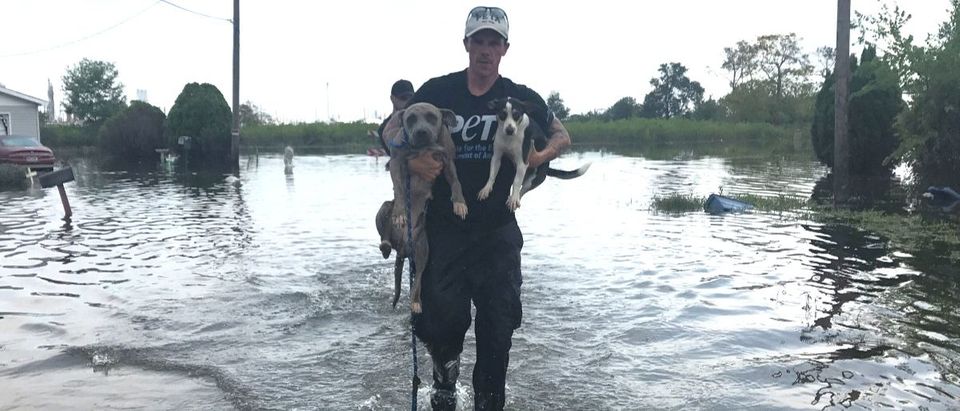Here at PETA, we wish the cases of cruelty to animals that we see every day were “fake news,” as Jared Whitley paints them in a recent column. But there’s no faking the heartbroken families whose dogs have been injured or even killed in the grooming rooms of big-box stores like PetSmart or the misery and premature deaths of orcas at SeaWorld, where seven marine mammals died just last year after spending their entire lives swimming in tanks of their own diluted urine.
PETA works hard to improve conditions for animals. Last year alone, we spent more than $2.2 million helping animals in some of the poorest areas of southeastern Virginia and northeastern North Carolina — including some without an animal shelter, a humane officer or even a veterinary clinic. PETA’s fieldworkers are on call 24/7, crawling through sewers, poking through junkyards, climbing trees, and coaxing terrified strays to safety. And when disaster struck, they rushed to rescue animals in hurricane-ravaged Texas and Puerto Rico.
When we use gimmicky tactics to get the word out about cruelty to animal — such as nearly naked protests or lying in a human-sized steel trap outside a fur store — it’s because we live in the age of Twitter and must be creative if we want to capture the public’s attention. Public awareness is why, in recent years, Ringling Bros. shut down, SeaWorld stopped breeding orcas, fur and angora have been rejected, the market for vegan foods has boomed and much more. And each victory that PETA has celebrated has been thanks to the support of kind people from all along the political spectrum who want a world in which animals are given the care, consideration, and protection that are only being withheld from them because of ignorance and arrogance.
It’s been that way since PETA was founded in 1980: PETA’s first case was the Silver Spring monkeys, who were caged, mutilated and given electric shocks in a filthy laboratory in Maryland. Our exposé led to the nation’s first arrest and criminal conviction of an animal experimenter for cruelty to animals and to landmark additions to the federal Animal Welfare Act, pushed through by Sen. Bob Dole and signed by President Ronald Reagan in 1985. The next year, representatives Robert Smith and Bob Dornan led the efforts to secure the monkeys’ release to a sanctuary.
Since then, PETA has counted on politicians on both sides of the aisle to help animals get a fair shake. First ladies from Pat Nixon to Melania Trump have shunned fur; G. Gordon Liddy often invited PETA to appear on his radio show and Patrick Buchanan on his TV show; and President George W. Bush has encouraged Americans to adopt dogs and cats. Republican strategist Mary Matalin, PETA’s 2016 Person of the Year, helped defeat numerous “ag-gag” bills, which sought to criminalize eyewitness exposés of indefensible suffering in the food industry, and co-hosted PETA’s 2017 inauguration party, which honored numerous animal-friendly members of Congress.
Animals don’t belong to political parties and don’t care about humans’ political affiliations. When PETA helps move neglected bears from concrete cells in shoddy roadside zoos to spacious sanctuaries, they don’t care who their rescuers voted for. When neglected dogs who have never known a kind word or touch receive medicine, food, doghouses and bedding from PETA’s fieldworkers, they don’t care which party they belong to. And not one of the more than 14,000 dogs and cats spayed or neutered by PETA last year wondered whether our veterinarians lean to the left or to the right.
Each and every one of us can adopt a dog from an animal shelter, buy shampoo that wasn’t tested in rabbits’ eyes, support travel companies that shun cruel elephant rides, shop in fur-free clothing stores or throw a veggie burger on the grill. These small everyday choices have a huge impact on animals, and that — not stirring up pointless controversy — is exactly the goal of every animal rights proponent.
Lisa Lange is the senior vice president of communications for PETA.
The views and opinions expressed in this commentary are those of the author and do not reflect the official position of The Daily Caller.


